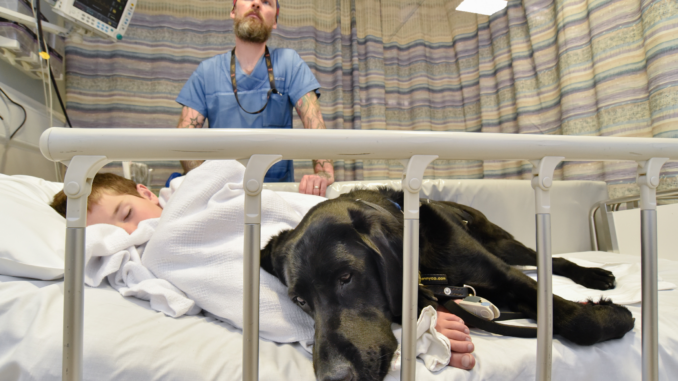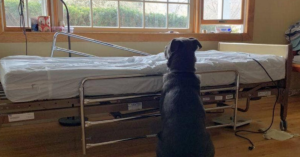
In the realm of pure, unshakable devotion, the bond between a dog and its owner is unmatched. They offer loyalty, love, and companionship without asking for anything in return. But sometimes, this unwavering devotion leads to heartbreaking moments, as seen in the case of a dog who continued waiting by its owner’s empty hospital bed, unaware that its beloved human had passed away.
A Love That Knows No Bounds: The Loyalty of Dogs
Dogs have long been recognized for their loyalty and ability to form strong emotional bonds with humans. These remarkable animals have an innate sense of attachment and are often deeply attuned to their owner’s emotions and well-being. Their capacity for empathy and love is truly extraordinary. So, when tragedy strikes, and a dog loses its owner, the emotional toll can be overwhelming, not just for the family, but also for the dog itself.
The story of a dog waiting at an empty hospital bed speaks volumes about the unspoken connection that exists between pets and their human companions. It’s a bond that transcends simple affection and enters the realm of profound emotional attachment. For this dog, its owner’s absence was felt deeply, yet the dog didn’t know that the person it had loved and waited for would never return.
The Empty Hospital Room: A Silent Vigil
Imagine the scene: a sterile hospital room, the soft hum of medical machines in the background, and a single, empty hospital bed. Yet, there is one occupant who remains—a dog, laying quietly by the bed, its eyes full of hope and confusion. This dog, unable to comprehend the finality of death, is waiting for its owner to return.
Day after day, the dog refuses to leave, lying motionless by the empty bed, perhaps hoping for a familiar hand to stroke its fur, or the sound of its owner’s voice. But time moves forward, and the bed remains empty.
How Dogs Sense the Absence of Their Owners
Dogs are incredibly intuitive animals, often capable of sensing shifts in their environment and the emotions of those around them. They can detect subtle changes in body language, tone of voice, and even scent. But when faced with the death of an owner, the dog’s understanding is limited. They may not fully grasp the concept of death, but they certainly sense the absence of the person they loved and trusted.
For the dog lying by the empty bed, the lack of familiar sounds, smells, and the comforting presence of its owner can be deeply confusing. The silence can be unbearable for a dog who is used to constant companionship and care. The confusion and emotional turmoil they experience can be overwhelming, especially when the dog is left without understanding the reason for the absence.

The Power of Rituals: Why the Dog Refused to Leave
One of the most striking aspects of this story is the dog’s refusal to leave the hospital room. Dogs are creatures of habit and routine, and they often form strong attachments to their surroundings. The hospital room, which had been a place of comfort and familiarity for the dog, was now a symbol of the bond it shared with its owner. The dog’s refusal to leave was likely its way of holding on to the last bit of the relationship it had with the person it loved.
This ritual of waiting by the hospital bed is a manifestation of the dog’s loyalty and emotional need for closure. It was the dog’s way of honoring its owner and holding onto the hope that their separation was temporary. Unfortunately, the reality of the situation was that the owner would never return.
The Grief of Animals: How Dogs Mourn Their Owners
While humans have a more complex understanding of grief, animals, especially dogs, also experience a form of mourning when they lose a loved one. Dogs may exhibit signs of depression, anxiety, and confusion after the loss of an owner. These behaviors can include:
- Loss of appetite: A grieving dog may stop eating, showing little interest in food or treats.
- Lethargy: Dogs in mourning may become listless, spending long periods lying down or avoiding physical activity.
- Destructive behavior: Some dogs may act out their grief by chewing on furniture, scratching, or becoming overly anxious.
- Separation anxiety: A dog that has lost its owner may exhibit signs of separation anxiety when left alone, displaying panic or distress.
- Increased vocalization: Dogs may whine, howl, or bark more than usual as a response to their grief.
This grieving process is not unique to humans—dogs experience emotions deeply and react in ways that reflect their sorrow, much like how people mourn the loss of a loved one.
The Dog’s Journey of Healing: How Time Can Help
After the loss of an owner, the healing process for a dog can be slow and gradual. Dogs, much like people, need time to adjust to the changes in their environment and their routine. The dog that once waited faithfully by the hospital bed would eventually begin to understand that the person it loved was not coming back.
This transition can be difficult, but with the support of a loving caregiver, the dog can find comfort in a new routine. In some cases, a second chance at companionship, such as being adopted into a new home or reuniting with familiar faces, can help the dog heal emotionally. However, the journey of healing is personal for every dog, and it’s important to allow them the time and space they need to grieve.
The Importance of Compassionate Care for Grieving Dogs
If you’re caring for a dog who has lost its owner, providing compassionate care is key to helping them through their grief. Offering comfort, stability, and a sense of security can help the dog navigate the difficult emotions it is experiencing. Here are some ways you can provide care for a grieving dog:
- Maintain a routine: Keeping a consistent feeding, walking, and sleeping schedule can help provide the dog with a sense of normalcy.
- Provide companionship: Spending time with the dog, offering affection, and engaging in activities they enjoy can help alleviate loneliness.
- Encourage exercise: While grieving dogs may feel sluggish, gentle exercise, like walks, can help them process their emotions.
- Consider professional help: If a dog’s grief is prolonged or severe, a professional dog behaviorist or trainer may be able to offer guidance.
The Heartbreaking Final Goodbye: A Dog’s Unwavering Loyalty
In the end, the dog’s vigil by the hospital bed is a testament to the incredible bond that can exist between a pet and its owner. It’s a story that reflects the depth of animal emotions and the lengths to which dogs will go to remain close to the people they love. Even though the dog didn’t fully understand the situation, its loyalty was clear—waiting by the bed was its way of saying, “I’m not ready to say goodbye.”
While the dog’s wait may have been in vain, it serves as a poignant reminder of how deeply animals are capable of loving and grieving. The emotional connection between dogs and their owners is one of the purest and most heartwarming aspects of life, showing us that love transcends all boundaries, even those of life and death.
Conclusion: The Unbreakable Bond Between Dogs and Their Owners
The story of the dog waiting by the empty hospital bed is a powerful reminder of the unique and unbreakable bond that can exist between pets and their owners. Dogs offer unconditional love, loyalty, and companionship, and in return, they deserve our kindness and care. As we reflect on this story, let us remember that animals, too, feel loss and grief—and that we have a responsibility to care for them, especially during times of sorrow.
FAQs
- Do dogs understand when their owners die? Dogs may not fully grasp the concept of death, but they can sense the absence of their owner and experience grief and confusion as a result.
- How long does it take for a dog to grieve the loss of an owner? The grieving process varies from dog to dog, but it can take weeks or even months for a dog to adjust to the loss of its owner.
- What can I do to help my dog cope with the loss of an owner? Providing a stable routine, companionship, and gentle care can help your dog cope with grief. Additionally, maintaining a calm and comforting environment is important.
- Can a dog die of a broken heart? While it is rare, some dogs can experience severe health issues due to emotional distress, which may result in a rapid decline in their health.
-
Should I consider getting another dog after mine passes away? This decision is deeply personal. Some dogs benefit from the companionship of another pet, while others may need time to adjust to the loss before considering a new companion.
